Special Report - A stimulating Annual Conference looks forward to URBACT III
Edited on
09 October 2017"Play your part, share your experience, make sure your voice is heard", advised Johannes Hahn, European Commissioner for Regional Policy, opening the URBACT Annual Conference "Cities of Tomorrow: Action Today". The message was not lost on the 417 urban practitioners, policy makers and elected officials from across the European Union who had gathered in Copenhagen last December for two days of intense exchange of ideas and expert testimony on solutions to the challenges faced by EU cities. Here are the highlights.
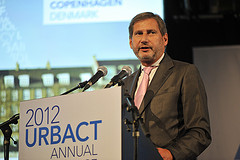 A proof of success of the all-important 2012 URBACT Annual Conference in December was the appearance of Johannes Hahn, European Commissioner for Regional Policy, as one of its headline speakers. He gave outright encouragement to the URBACT programme, present and future, during the current negotiations over Europe's future funding period: "I urge you to follow the process over the coming months closely and actively," he told delegates in the opening plenary session.
A proof of success of the all-important 2012 URBACT Annual Conference in December was the appearance of Johannes Hahn, European Commissioner for Regional Policy, as one of its headline speakers. He gave outright encouragement to the URBACT programme, present and future, during the current negotiations over Europe's future funding period: "I urge you to follow the process over the coming months closely and actively," he told delegates in the opening plenary session.
Plan for the world's first CO2-neutral capital
And what better city to host the event than Copenhagen? Its Lord Mayor, Frank Jensen, told delegates that the city had just adopted a plan to become the world's first CO2-neutral capital by 2025 "because we believe that sustainability and sustainable urban development is critical if we are to create jobs and economic growth, as well as quality of life for our citizens".
Snow was on the ground and the temperature was down to -7C but that did not stop delegates from following a treasure hunt around the city sights, then later traveling to dinner across the redeveloped port on an ice-breaker vessel.
Confidence in URBACT's role
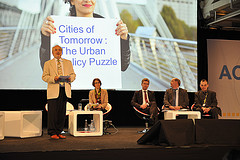
The conference came at a critical juncture in European development. Against a backdrop of challenging economic times, negotiations are continuing on the European Commission Cohesion Policy budget for 2014-20 and there is much debate within Europe about the importance of urban projects for Regional Development Funds.
At the political panel discussing European Union (EU) responses to urban challenges, Claes Nilas, Permanent Secretary of State and Deputy Minister at the Danish Ministry of Housing, Urban and Rural Affairs, and chair of the URBACT Monitoring Committee, said he had confidence in URBACT alone to fulfill this role. That confidence was reiterated by Michael Ralph, advisor to the European Commission's Director-General for Regional and Urban Policy, who stressed the importance to the EU of the next chapter: URBACT III.
Lessons from the wider world
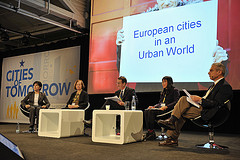
Jan Olbrycht, Member of the European Parliament (MEP) and President of the Urban Intergroup, caused controversy by pointing out that the EU is made up of member states, not cities. But he said that the EU appreciated the importance of cities. The draft legislation on European Regional and Development Fund (ERDF) requires only 5% of funding to be earmarked for urban projects. But such a low figure should not be a cause for dismay: that 5% was a minimum, he said, and countries could decide to spend 100% of their funding on urban schemes if they wished to.
In another plenary session, Europe was learning lessons from the wider world in the panel debate "European Cities in an Urban World". Where once Europe had exported its know-how on cities, now it had much to learn from rapid urbanisation in Asia and citizen involvement in urban development in New York or Rio de Janeiro.
Buzz and feedback from the URBACT Café
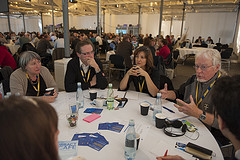
So much for the bigger picture, but what about the local grassroots level? Perhaps the biggest buzz came from the popular URBACT Café, where delegates could make their voices heard by exchanging their own experiences and ideas around tables designated for each nationality. The lively discussions produced valuable feedback for the next stage of the URBACT strategy.
After the projects and Local Action Plans, there was a general demand for greater professional and practical support from URBACT, notably for it to provide advice on how to access European funding streams to implement those plans, and to supply training for city staff and elected representatives.
Participants were eager to receive advice on many aspects of governance, from dealing with austerity and migration to Public Private Partnerships. They also praised the Summer University and will no doubt be looking forward to the next one, in Vilnius, this year.
Six workshops in coloured hats
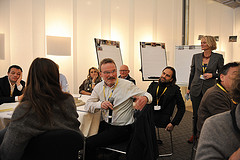
The lessons learned from URBACT projects were the subject of six separate workshops:How can cities create more jobs; How can cities foster active inclusion through social innovation; How can cities fight against the socio-spatiale divide; How can cities manage demographic change; How can cities improve buildings' energy efficiency; How can cities develop low-carbon environments through better mobility and accessibility. It was another chance for delegates to participate in the debates. The workshop leaders wore eye-catching hats, a different colour for each subject, to present their themes, and delegates were urged to make their choice – and then follow the appropriate hats to join the group!
In these workshops, drawing on URBACT results and other studies, experts and academics identified the keys to the challenges facing cities. But when they reported back to the plenary session, the coloured hats were all mixed up on the platform. It was a graphic way of highlighting the message that there can no longer be a "silo mentality" to city policy-making and problem-solving: all the subjects benefit each other.
Thought-provoking messages
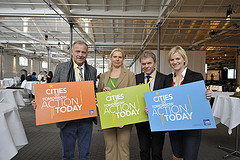
As MEP Jan Olbrycht stressed in the opening session, cities need to consider the three pillars of sustainable development – smart, green and sustainable growth – as overlapping ideas that must be dealt with holistically.
It was one of the many thought-provoking messages that delegates took away with them at the close of a rewarding conference experience.
To find out more, all post-event materials including workshop presentations and reports are available on the URBACT Annual Conference website.
- Post-event Materials - URBACT Annual Conference website
- Annual Conference Output - European Cities in an Urban World - URBACT website
- Annual Conference Output - EU responses to urban challenges - URBACT website
- Annual Conference Output - Report on the URBACT Café - URBACT website
Submitted by admin on
